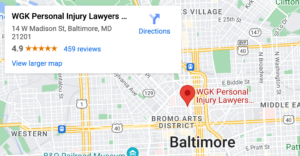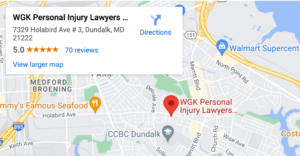
Generally speaking, torts are defined as “civil wrongs,” but intentional torts are more akin to criminal issues and can be defined as suffering inflicted by a person intentionally. However, these torts are treated under civil and criminal jurisdictions, depending on the severity and nature of the wrong committed.
Every U.S. state has provisions dealing with intentional torts, which are more or less similar. However, if you feel you have been a victim of an intentional tort in Baltimore and want to seek a remedy for it, it is better to understand the difference between negligent tort and intentional tort first.
Table of Contents
What Makes Negligent and Intentional Torts Different?

Negligent torts, as the name suggests, include wrongs that cause injury to the victim because of the negligence of the wrongdoer. The damages, in most cases, are demanded by civil action. For instance, a car accident falls under the negligent tort category; the victim or their heirs may demand monetary compensation.
However, an intentional tort corresponds to the offender’s intention, or what we call “mens rea” in legal terms. The plaintiff may seek compensatory damages in case of an injury.
Moreover, just like a majority of criminal cases, the most difficult aspect of this tort is to prove the deliberate “intent” of the wrongdoer. And that’s why you need a professional attorney to plead your case in such a situation.
Types of Intentional Torts
Tortious claims in Baltimore are mainly dealt with under the Maryland Tort Claims Act (MTCA). An intentional tort has several subcategories, such as assault, battery, defamation, slander, libel, emotional distress, trespass, and false imprisonment.
Assault
Assault means an intentional act or a gesture that gives an impression, or reasonable apprehension, that the assailant is going to cause you injury at any moment. Even if you feel threatened by a person preparing for an act that is likely to cause you harm, it also constitutes assault.
For instance, if you get into a heated dispute with a person, and he takes out his gun and points it at you while menacing some words, you can file a suit against him for assault.
Battery
Battery occurs when an assailant intentionally injures the victim by making harmful contact with them without their expressed or implied consent. However, unlike assault, the harmful contact should be direct contact that results in a physical injury.
For example, if a person intentionally spills a hot cup of coffee over a victim, they can be charged with battery.
Defamation, Slander, and Libel
Defamation means insulting someone’s name or reputation by spreading false information. However, slander and libel are the means to commit defamation. It is an actionable claim where a person can bring a damages lawsuit against the defendant and demand compensation. But before you bring the claim to the court, it is better to determine if the case comprises the following elements:
- Use of false and wrong information.
- Spread fictitious information orally or by publishing or broadcasting it.
- Intention to malign the reputation of the victim.
- Committed by words, images, videos, etc.
Furthermore, in a defamation suit, the plaintiff can also demand damages for emotional distress or mental anguish that they went through because of defamation.
Emotional Distress
If you have been exposed to some intentional, outrageous acts of a person, you can file suit against that person for causing emotional distress. Even if no physical injury occurs in this tort, it may lead to mental torture.
For instance, if you face gender or race discrimination in the workplace, which is likely to cause you emotional distress, you can seek compensatory damages.
Trespass
Unlike criminal trespass, tortious trespass relates to a person’s intentional dwelling on someone else’s property to cause a disturbance.
However, it is not limited to the physical contact of the wrongdoer with the victim’s property. The trespasser may help a third person enter the property to fulfill their malicious intent, or they may use any other means to remove the property from the possession of the victim to constitute a trespass.
The three types of trespass covered under Maryland laws include:
- Trespass to land: When someone or something enters your real property without your permission or prior consent.
- Trespass to chattels: When someone intentionally interferes with your personal property (not real), which is in your possession or ownership.
- Trespass to conversion: It is similar to trespassing to chattels, with a small difference in the degree of interference. It involves the wrongdoer interfering with personal property, and the usage alters something in the property.
The victim then may bring an action against the defendant and claim compensatory and nominal damages.
False Imprisonment
False imprisonment includes the wrongful confinement of a person where the wrongdoer voluntarily restrains the victim from moving out of a defined boundary. However, this concept does not apply to the limited detaining rights provided to law enforcement agencies and security managers/shopkeepers in case of a suspected criminal/shoplifter.
What Remedies Do You Have if You Are Affected by Intentional Torts?
The remedy in the case of most tortious claims is pecuniary compensation. The victim/plaintiff may claim economic and non-economic damages in most intentional tort cases. And in rare cases, punitive damages might be available.
Consider Hiring an Attorney
Under tortious liability, there is no yardstick to measure damages, nor is there any prevalent rule of thumb to ascertain monetary relief. Every case is different. It all depends on convincing the judge or jury to restore the person to their actual position before the damage was incurred. Consequently, having an experienced tort lawyer who can build a case and present it effectively is critical in a courtroom.
Call WGK Personal Injury Lawyers for a free, no-obligation case review to determine if you are a victim of any such damages. Contact us today at (410) 837-2144.


